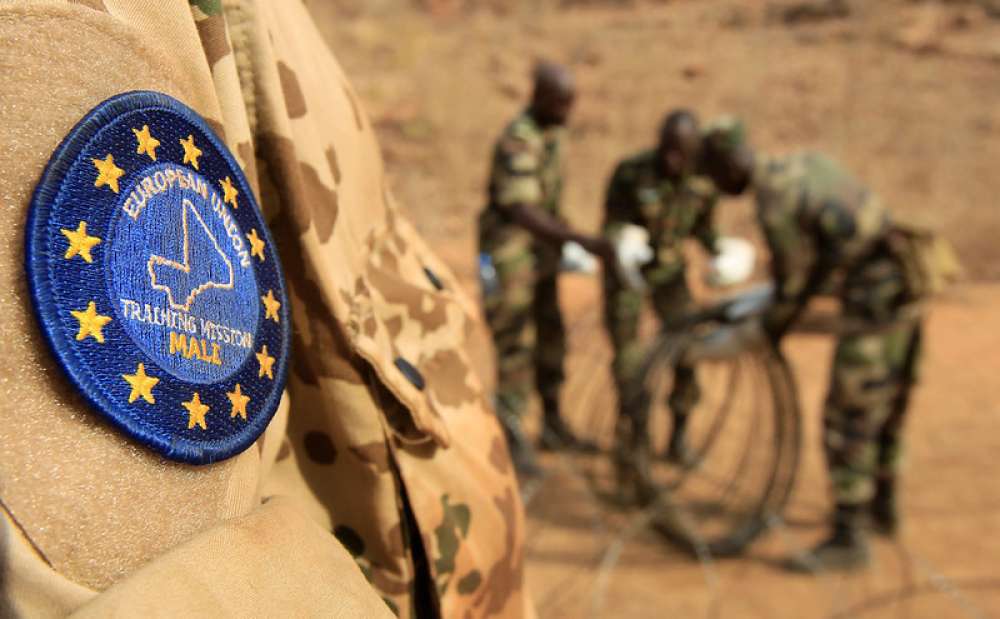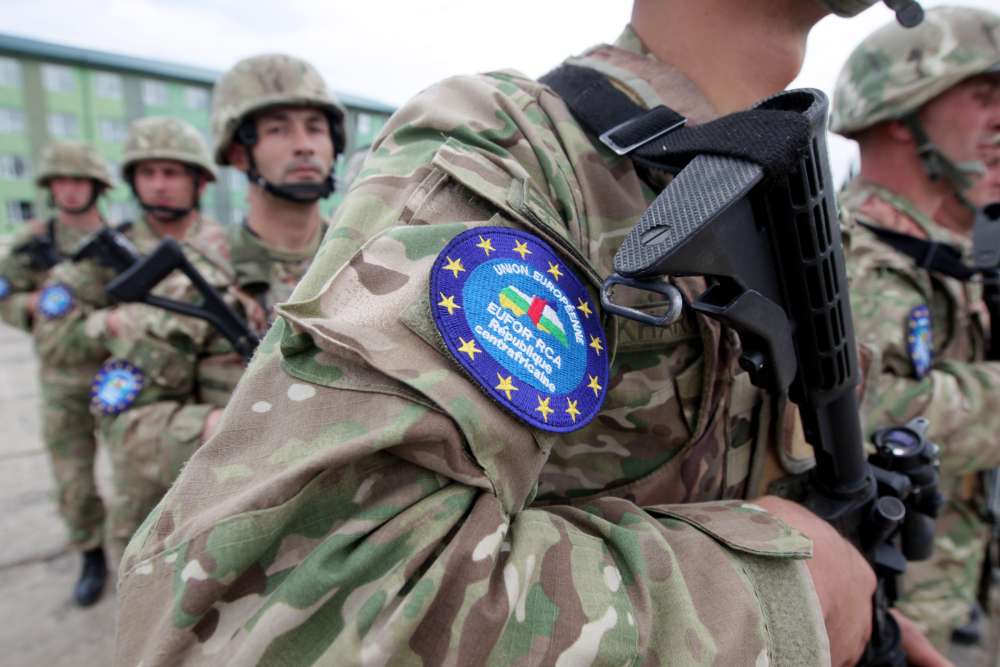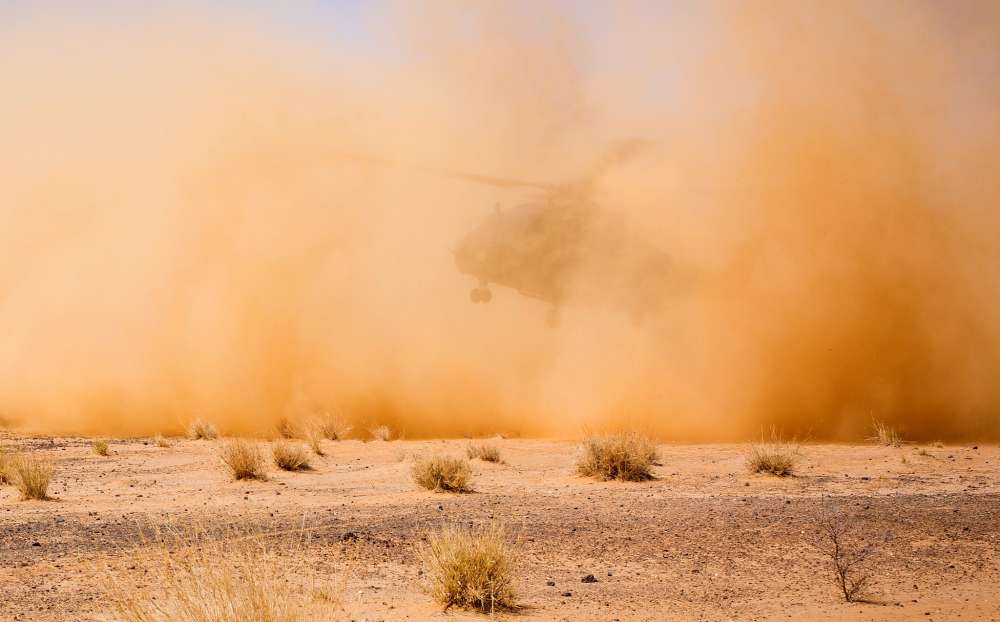“The Issue of Good Governance has Become Too Marginalized in German Security Assistance”

(Bundeswehr /Flickr)
Germany has shifted its approach to stabilization in the Sahel, from peacebuilding to a stronger emphasis on militarization. The results have been disappointing, says Olivier Guiryanan. Why Berlin should adjust course – and how.
Looking back over the past few years, how would you characterize Germany’s stabilization and peacebuilding efforts in crisis contexts abroad?
Germany is one of the most methodical partners when it comes to stabilization and peacebuilding in the Sahel. Its interventions over the past five years are based on the Guidelines adopted in 2017 on preventing crises, resolving conflicts and building lasting peace. We clearly see a massive commitment, with numerous ministries involved and substantial funds mobilized – more than 500 million Euros for the Sahel. However, there is a huge difference between intervention in theory and in practice. Germany has struggled to assert its own principles in the Sahel due to the primacy of the French approach: France views the Sahel region as a strategic priority, and other countries, including Germany, have followed its heavily securitized agenda – and seen disappointing results. It is important to remember that it takes more than ‘hard’ security to achieve peace.
In a 2021 report on European security assistance in the Sahel, which you co-authored with colleagues from Saferworld, you identified a shift from a civilian focus to an increasing ‘securitization’ of German policies. How did this manifest in the Sahel and what do you recommend?
Indeed, Germany has substantially changed its approach to security in the Sahel – from peacebuilding to militarization. Germany has made a military commitment to the United Nations peacekeeping mission in Mali (MINUSMA) and is training security forces in the region. Given the current levels of insecurity in the Sahel – if we look at, for example, the recent coups in Mali and Burkina Faso – we have to conclude that the so-called hard security approach adopted by Germany and other international actors is failing. They would have reaped better results by focusing on building peace and strengthening the delivery of basic services – in other words, by responding to people’s real needs.
To effectively tackle violence, the Sahel countries need to work with Germany and other international partners to determine the root causes of insurgency. That means they need more concrete insights into and a nuanced understanding of the conditions that lead to violent acts and result in vengeance by conducting regular participatory analyses of conflict, peace and power dynamics with communities and civil society. This should then inform policies, programs and strategies. It is crucial that the Sahel states uphold democratic principles and ethical standards when embarking on these reforms, and that they do so in an inclusive way. Germany could really make an impact here through supporting democratic governance, oversight and the reform and accountability of the security sector.
» The so-called hard security approach adopted by Germany and other international actors is failing. They would have reaped better results by focusing on building peace and strengthening the delivery of basic services. «
Russia’s war against Ukraine has catapulted so-called hard security considerations to the center of the German debate on foreign policy again. In your view, what are some of the possible consequences of this for other contexts, such as the Sahel?
The war in Ukraine is having profound effects on approaches to international intervention, most dramatically for Germany, where military spending has suddenly become a government priority. I believe this strengthening of the military approach will be to the detriment of humanitarian and development aid in the Sahel.
In its pursuit of strategic influence in, for example, the Sahel and the Central African Republic, Russia is providing military support to its partners and thus reinforcing the militarization of already insecure countries. Germany’s strategy for countering Russia’s strategic gains in the region might entail sending arms and military equipment to Sahelian governments, as is currently happening in Ukraine, in order to win their confidence. This could lead to a proliferation of arms and further escalation of violence, and thus threaten lasting peace in the region.
What do you see as the main lessons that German and, more broadly, European stabilization and peacebuilding actors should learn from previous engagement and stabilization efforts in the Sahel?
Germany participated in the EUTM Mali mission, which aimed to strengthen Mali’s security forces and funded the Lake Chad Basin stabilization program. What is happening there now? Civilians are experiencing forced disappearances, homicides, attacks, and sexual violence – not only from armed groups like the Islamic State or Boko Haram, but also from Mali’s state security forces. The first lesson, then, is that Germany’s increased military support has had a negative effect on peacebuilding.
The use of state force against civilians in these places clearly shows that justice needs to be a priority. However, for there to be strong and fair justice, governments need to be democratically elected. The issue of good governance – an essential component of peace – has become too marginalized in German security assistance. The second lesson is that there is a need to focus on reforming the security sector in the Sahel, because too much priority on military security undermines peace, reconciliation, democracy, and development. The result is a decline in the rule of law, with consequences like recurring coups, general instability and insecurity.
» Germany's increased military support has had a negative effect on peacebuilding. The use of state force against civilians in these places clearly shows that justice needs to be a priority. «
What added value could Germany bring to international efforts in conflict-affected and fragile contexts generally?
I know from my experience with German organizations working in Chad and West Africa that Germany can offer significant added value when it comes to building the foundations of lasting peace. In my opinion, the prerequisite for any long-term support is to have countries where the law works, and where leaders are democratically elected to key positions. Secondly, Germany is well known for its commitment to peacebuilding, development and good governance. Its added value as a partner in this regard lies with supporting and sharing its experience and best practices in this field with local partner countries.
What are your recommendations for the German government as it draws up the country’s new National Security Strategy? What should Germany’s international engagement and stabilization efforts look like going forward?
True security can only result from the proper functioning of a country’s institutions. If France continues to turn a blind eye to state abuses in the Sahel, and if German authorities neglect to provide support to state and civil society which prioritizes addressing the needs of the people in the region – who are the lifeblood of democracy – then their approach toward and policy in the Sahel will fail. Germany should return to prioritizing long-term peace, development and good governance in its international initiatives in conflict-affected countries.
» Civil society is an important link in a global chain and an essential change agent for sustainable peace and development. «
How can Germany better support civil society in working toward peace in contexts such as the Sahel? Why is that important?
In our work through the Security Policy Alternatives Network (SPAN) SPAN, we strongly emphasize the importance of supporting civil society as a necessity for fostering peace and democracy. Civil society is an important link in a global chain and an essential change agent for sustainable peace and development. Each time international partners do not understand this need, their projects and programs fail to produce substantial transformational effects. This is an essential equation that the German government must work to resolve. To address root causes of conflict, Germany should engage with civil society organizations at all stages, for example by providing training and financial support, or by guaranteeing the safety of civil society actors who work toward making governance in the Sahel more transparent.
This interview was carried out in cooperation with Lucia Montanaro and Felicity Roach from Saferworld.
Olivier Guiryanan
Executive Director, Bucofore
Keep on reading

Zeitenwende statt Stillstand bei EU-Krisenmanagement-Einsätzen
Alle reden von Europas Verteidigung. Aus gutem Grund. Doch die EU braucht auch eine Erneuerung ihrer internationalen militärischen und zivilen Einsätze.

Für die Sicherheit in Friedenseinsätzen: Desinformation mit strategischer Kommunikation bekämpfen
Feindliche Desinformationskampagnen gefährden Friedenseinsätze und dadurch auch deutsches Einsatzpersonal. Strategische Kommunikation ist die beste Verteidigung dagegen.

Kohärente Friedenspolitik: Auf den Inhalt kommt es an
Dass Ressortkonkurrenz außenorientierte Politik nicht erfolgreicher macht, ist eine Binsenweisheit. Dass alle Teile der Regierung am selben Strang ziehen, reicht jedoch nicht aus. Es muss auch die Richtung stimmen.